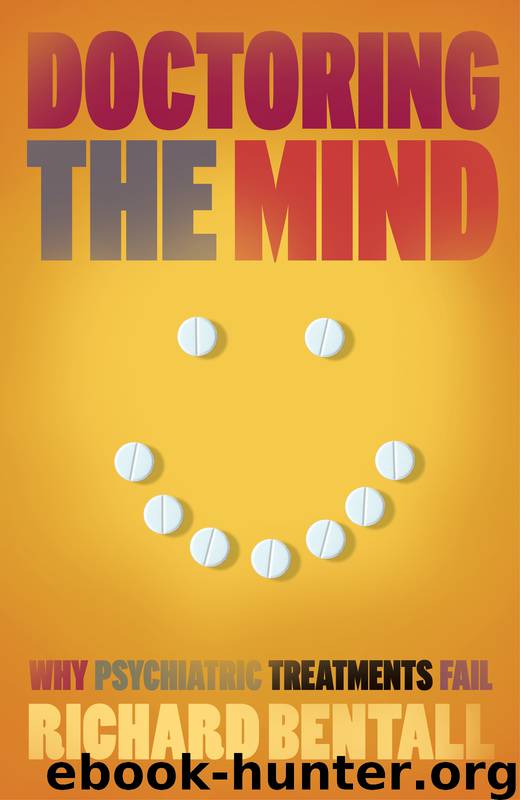Doctoring the Mind by Richard P Bentall

Author:Richard P Bentall
Language: eng
Format: epub
ISBN: 9780141917832
Publisher: Penguin Books Ltd
Published: 2009-12-01T16:00:00+00:00
We all need to understand randomized controlled trials
Despite the difficulties we encounter when trying to judge whether a treatment has been decisive in the individual case, a principled method of deciding which treatments are generally effective is obviously required; otherwise how would doctors know which therapies to offer their patients? The demand for accurate information about treatment effectiveness has become especially pressing in recent decades, as increased spending on health has consistently failed to match escalating demands for medical resources.2 This has happened because we now expect clinicians to deal with a wide range of difficulties (infertility, cosmetic challenges, moderate depression, for example) which were simply tolerated as bad luck a few decades ago, because new medical technologies (for example MRI and genetic screening) are increasingly expensive, and because people are now living longer.3
During the 1970s, two books written by British researchers led to a great debate about the impact of medicine on society and highlighted the senselessness of spending money on ineffective treatments, or therapies which are so expensive that other services have to be compromised to pay for them. The Role of Medicine: Dream, Mirage or Nemesis?,4 written by Birmingham University professor Thomas McKeown and published in 1979, argued that many of the health gains achieved during the nineteenth and early twentieth centuries were the consequence, not of advances in medical science, but of improvements in nutrition and sanitation. According to McKeown, both professionals and lay people had therefore acquired unrealistic expectations about what medicine could do. Later commentators would challenge McKeown’s analysis, claiming that, although public health measures have been decisive in reducing infant mortality, the improvements in health after the Second World War were largely attributable to advances in the treatment of the diseases of later life, such as heart disease, cancer and stroke.5
Effectiveness and Efficiency: Random Reflections on Health Services,6 published a few years earlier by the University of Cardiff-based epidemiologist Archie Cochrane (memorably described by McKeown as ‘An itinerant preacher who emerges at intervals from his Welsh retreat to admonish the faithful for failure to submit all aspects of their lives and works to scientific appraisal’), similarly observed that medical interventions were often costly and ineffective, but attributed the apparent impotence of clinical services to poor scientific methods, and particularly the failure to rigorously evaluate new treatments.
These challenges stimulated a global movement towards evidence based medicine, which has been defined as ‘the conscientious, explicit and judicious use of current best evidence in making decisions about the care of individual patients’.7 This movement has been embraced by governments worldwide hoping to limit expenditure on health care. It has also been embraced by doctors and other health care professionals anxious to provide the best treatments for their patients. It has led to the establishment of new research centres in universities in many countries, where clinicians and statisticians comb the available evidence to try and reach general conclusions about which treatments are effective and affordable. In this chapter, I argue that this movement has not so far
Download
This site does not store any files on its server. We only index and link to content provided by other sites. Please contact the content providers to delete copyright contents if any and email us, we'll remove relevant links or contents immediately.
The Art of Thinking Clearly by Rolf Dobelli(10489)
The 5 Love Languages: The Secret to Love That Lasts by Gary Chapman(9815)
Mindhunter: Inside the FBI's Elite Serial Crime Unit by John E. Douglas & Mark Olshaker(9343)
Becoming Supernatural by Dr. Joe Dispenza(8217)
Nudge - Improving Decisions about Health, Wealth, and Happiness by Thaler Sunstein(7707)
The Road Less Traveled by M. Scott Peck(7603)
Mastermind: How to Think Like Sherlock Holmes by Maria Konnikova(7347)
Enlightenment Now: The Case for Reason, Science, Humanism, and Progress by Steven Pinker(7313)
Win Bigly by Scott Adams(7198)
The Way of Zen by Alan W. Watts(6614)
Factfulness: Ten Reasons We're Wrong About the World – and Why Things Are Better Than You Think by Hans Rosling(4742)
The State of Affairs by Esther Perel(4721)
Gerald's Game by Stephen King(4654)
Man's Search for Meaning by Viktor Frankl(4606)
The Confidence Code by Katty Kay(4260)
Thinking in Bets by Annie Duke(4227)
The Healing Self by Deepak Chopra(3580)
Hidden Persuasion: 33 psychological influence techniques in advertising by Marc Andrews & Matthijs van Leeuwen & Rick van Baaren(3565)
The Worm at the Core by Sheldon Solomon(3487)
